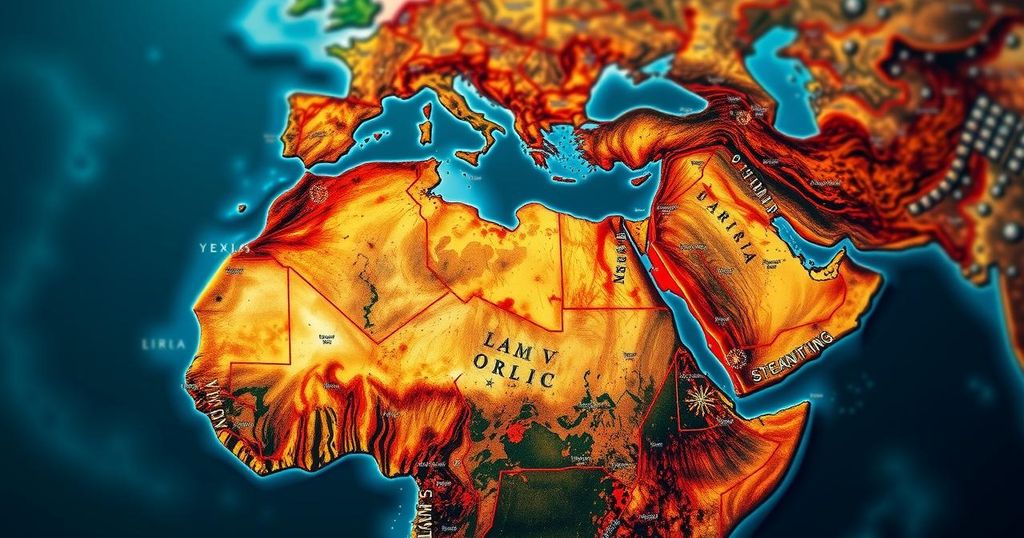Egypt’s Strategic Military Alliances in Response to Ethiopia’s Ascendancy in the Horn of Africa

In October 2023, Egypt, Eritrea, and Somalia organized a trilateral summit in Asmara, pledging military support for Somalia’s counterterrorism efforts amidst rising tensions with Ethiopia over the GERD. Egypt aims to restore its influence through strategic alliances while countering Ethiopia’s expanding reach, particularly in light of the Entebbe Agreement’s implications on Nile water management. Historical context reveals a persistent decline in Egypt’s regional role, exacerbating current geopolitical conflicts surrounding water security and national interests.
In early October 2023, the leaders of Egypt, Eritrea, and Somalia convened in Asmara at a trilateral regional summit, affirming their mutual military support for Somalia’s counterterrorism initiatives. This summit has been perceived as part of Cairo’s strategic response to Ethiopia’s increasing influence in the region, particularly following Ethiopia’s January memorandum with Somaliland to establish a military base in exchange for recognizing Somaliland’s independence. The tensions between Egypt and Ethiopia have persisted primarily due to disagreements over the Grand Ethiopian Renaissance Dam (GERD), which Cairo regards as a significant threat to its national security. Moreover, the recent implementation of the Entebbe Agreement, which governs the Nile River’s water management, has been seen as detrimental to Egypt’s water security. As stated by Iman Abdel Azim, a political science professor at Cairo University, Egypt’s recent summit attendance underscores its efforts to re-establish alliances in Africa through military and diplomatic collaboration. Following the Asmara meeting, Egypt has taken significant steps to enhance its military presence in the region, including a joint military defense pact with Somalia and subsequent arms shipments, as well as a defense agreement with Eritrea. Political analyst Amani El-Tawil notes that Egypt’s growing military and strategic partnerships reflect its departure from traditional cooperation, as the country actively seeks to counteract Ethiopia’s unilateral actions that undermine Egypt’s interests in the Horn of Africa. Abbas Sharaky, a water resources expert, highlights that the GERD project, originally conceived as a developmental initiative, has become a nationalistic endeavor under Ethiopian governance, resulting in a critical reduction of water supply for Egypt. Consequently, Egypt has relied on reserves from its Aswan High Dam to mitigate the deficit, prompting several domestic measures to address the growing water crisis. Despite negotiations spanning over a decade, Ambassador Mona Omar indicates that Egypt has not successfully fostered cooperation regarding Nile waters, leading to an urgent need for new strategies. The decline of Egypt’s influence in Africa, which was notably prominent during President Gamal Abdel Nasser’s era, has created room for Ethiopia to amplify its regional ambitions, particularly with military aspirations in Somaliland. Despite these challenges, Egypt’s renewed engagement with neighboring countries could signify a potential shift in the balance of power, as both nations vie for allies amidst escalating tensions concerning water security and geopolitical interests in the Horn of Africa.
The article addresses the geopolitical dynamics in the Horn of Africa, specifically focusing on the alliance between Egypt, Eritrea, and Somalia against Ethiopia. It highlights the historical context of tensions between Egypt and Ethiopia, largely centered around the Grand Ethiopian Renaissance Dam and water resource management, particularly concerning the Nile River. The article also provides insights into Egypt’s strategic efforts to rebuild its influence in the region and contrasts the current political landscape with that of Egypt’s past prominence in African affairs.
In conclusion, the formation of Egypt’s anti-Ethiopia alliance in the Horn of Africa underscores the escalating geopolitical tensions in the region, particularly surrounding water security issues arising from the GERD. Egypt’s renewed assertiveness in forging military alliances with neighboring countries illustrates its desire to counterbalance Ethiopia’s influence and re-establish its regional standing, amid ongoing challenges stemming from historical disputes over Nile waters. The current developments signify not only a strategic maneuvering of power in the region but also a critical juncture in the longstanding struggle between these nations for security and cooperation.
Original Source: www.newarab.com








